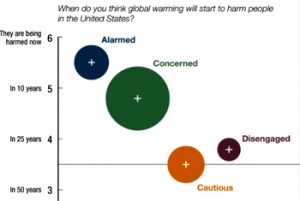
Alarmed Americans believe global warming is occurring today and try to prevent it. Those in the dismissive category strongly believe it is not occurring. The dots' size reflects the proportion of survey respondents. Click for full graph.
By Allison Bush, bushalli@msu.edu
Great Lakes Echo
June 17, 2009
Although a new federal report says global warming is already causing harm, many Americans believe it is tomorrow’s problem – that it won’t hurt people for another 10 years.
And those surveyed in five Great Lakes states are less worried than the national average, according to a recent study by the Yale Project on Climate Change and the George Mason University Center for Climate Change Communication.
The study found six levels of concern about warming caused by the burning of fossil fuels for energy and transportation. These “six Americas” were defined as alarmed, concerned, cautious, disengaged, doubtful and dismissive.
“Basically, we believe you can find the six groups in any community – just different proportions,” Anthony Leiserowitz, study co-author and a research scientist at Yale’s School of Forestry and Environmental Studies wrote in an e-mail.
The study found that in the region containing Indiana, Illinois, Michigan, Ohio and Wisconsin there are fewer members of the alarmed segment and more members of the doubtful and dissmissive segments than the national average.
Only 10.9 percent of those surveyed in that region said that they were alarmed, compared with the 18 percent nationally.
This could be a result of different climate policies in the different regions, Edward Maibach, director of George Mason’s Center for Climate Change Communication and a co-author of the study, wrote in an e-mail. Regions that have the strongest climate policies would likely have the highest number of alarmed residents, he said.
Nationwide, the concerned segment — representing the second highest level of worry – was the largest group, containing 33 percent of those surveyed, Maibach said.
| Degree of Concern | National Average | Great Lakes* Average |
| Alarmed | 18% | 11% |
| Concerned | 33% | 36% |
| Cautious | 19% | 17.5% |
| Disengaged | 12% | 14% |
| Doubtful | 11% | 14% |
| Dismissive | 7% | 8% |
*Includes Illinois, Indiana, Michigan,
Ohio and Wisconsin
And it is not as though residents of the five Great Lakes states are unworried. Even though they fell below the national average when it came to alarmed citizens, more of them – 36 percent of those surveyed – identified with the concerned segment than the national average.
“There is such clear proof that global warming is a problem,” Maibach said. “And concerned individuals are merely reflecting what is being presented almost daily in our newspapers and magazines.”
The difference between concerned and alarmed individuals is that the latter want to take action today to prevent global warming, rather than viewing it as a problem down the road, Maibach said.
The smallest group was dismissive, with 7 percent. People falling in that group believe strongly that global warming is not occurring.
The region with the most alarmed respondents – 25.7 percent – includes Alaska, California, Hawaii, Oregon and Washington. The region with the most dismissive respondents — 13.6 percent — includes Arizona, Colorado, Idaho, New Mexico, Montana, Utah, Nevada and Wyoming.
The study also looked at the types of people Americans trust when it comes to providing information on global warming.
At the top:
– 29 percent of the population strongly trust scientists
– 17 percent strongly trust environmental organizations
– 15 percent strongly trust Al Gore.
– 13 percent strongly trust Barack Obama
– 13 percent strongly trust family and friends
At the bottom:
– 6 percent strongly trust television weather reporters
– 5 percent strongly trust religious leaders
– 4 percent strongly trust John McCain
– 4 percent strongly trust the mainstream news media
– 1 percent strongly trusts corporations.